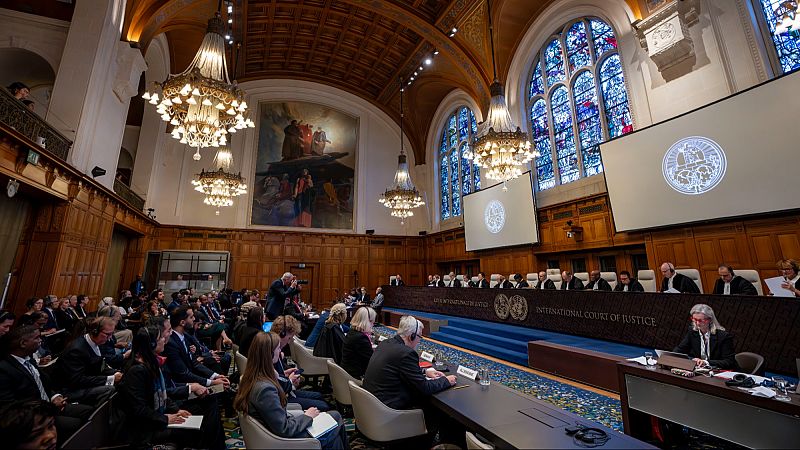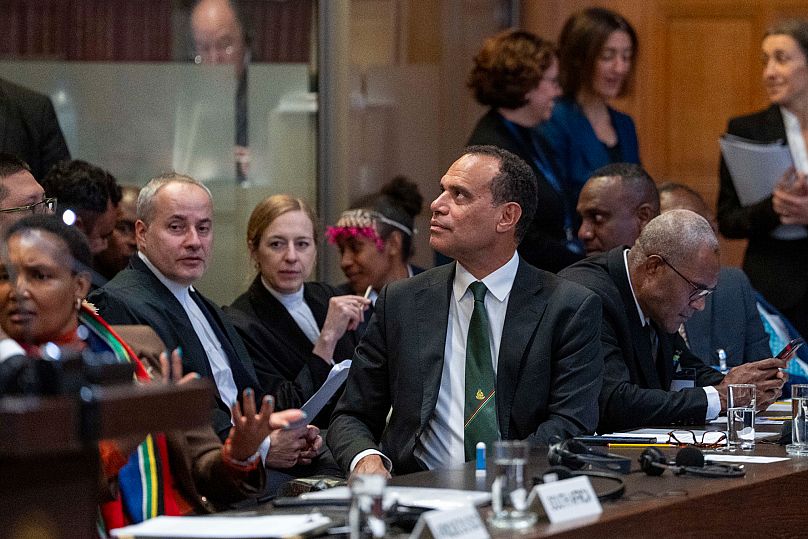
The UN’s top court will deliver a landmark advisory opinion setting out countries’ legal obligations to address climate change on Wednesday.
The ruling from the International Court of Justice (ICJ) will also set out consequences for those states whose emissions have harmed the planet.
Legal experts believe it is the most significant in the latest string of rulings on international climate law and has the potential to impact governments and companies around the world.
Jotham Napat, Prime Minister of the Republic of Vanuatu, said ahead of the ruling that it isn’t just a legal milestone, it's a “defining moment in the global climate justice movement and a beacon of hope for present and future generations”.
What is the ICJ being asked about countries’ climate obligations?
This story begins with a 2019 campaign by Pacific Island students calling on governments to go to the ICJ to clarify states' climate obligations under international law. Backed by Vanuatu and more than 130 other nations, the UN General Assembly formally referred the questions to the ICJ in March 2023.
The panel of 15 judges at the ICJ has been asked by the UN to answer two questions.
Firstly, what obligations do states have under international law to address climate change for both current and future generations? Second, what are the legal consequences for states that fail to meet these obligations, causing serious climate harm?

At hearings in December last year, the ICJ heard from more than 100 countries and organisations, with written statements or comments from around 150 more, making it the largest case the top UN court has ever seen.
Though advisory opinions from the ICJ aren’t binding, they do carry significant legal weight and authority.
A ‘David versus Goliath’ battle
It has been dubbed a ‘David versus Goliath’ battle, with vulnerable nations attempting to create a more robust framework to set clear international legal obligations for climate action.
“We turned to the Court to clarify what international law already requires of States, because putting all our faith in mechanisms like the UNFCCC and Paris Agreement are not generating the actions the world urgently needs fast enough,” Napat said.
Pacific nations have watched their homelands disappear due to climate change. More than a third of Tuvalu’s population applied for a climate migration visa earlier this year, and in Nauru, the government has begun selling passports to wealthy foreigners to raise funds for potential relocation efforts.

Vanuatu itself has been hit by intensifying cyclones, rising seas and saltwater intrusion threatening its residents’ way of life.
“We sought confirmation that States’ legal obligations extend to their climate-related actions, especially when those actions have caused harm beyond borders,” Napat added.
Some major polluters, like the US and Russia, made the case that the current international legal framework, under which the Paris Agreement was made, is sufficient. They argue that new guidelines on what countries are obliged to do are not needed.
How could the ICJ ruling impact global climate action?
The ruling is expected to provide a clear legal benchmark which will lay out countries’ climate obligations under international law.
Many believe it could help accelerate funding for Loss and Damage, pin down more ambitious targets for mitigation and shape international climate negotiations for years to come - including those at COP30 in Brazil later this year.
The advisory opinion will also have major implications for judgments in climate cases in courts around the world, serving as the basis for other legal actions, including domestic lawsuits.
Activists, for example, could bring legal cases against their country for not complying with the ruling and states could hold each other accountable at the ICJ.
“A favourable opinion from the Court could affirm that States have had long-standing legal obligations to act on climate change, including obligations rooted in human rights and environmental law,” according to Vanuatu’s PM.
“It could clarify the legal consequences for States that have failed to meet these obligations. It could provide a powerful tool for courts, communities, and negotiators around the world to seek remedies for the climate injustices that have occurred. It could support vulnerable nations in securing climate finance, technology, and loss and damage support.
"And it could help shift the global response from promises to accountability.”







